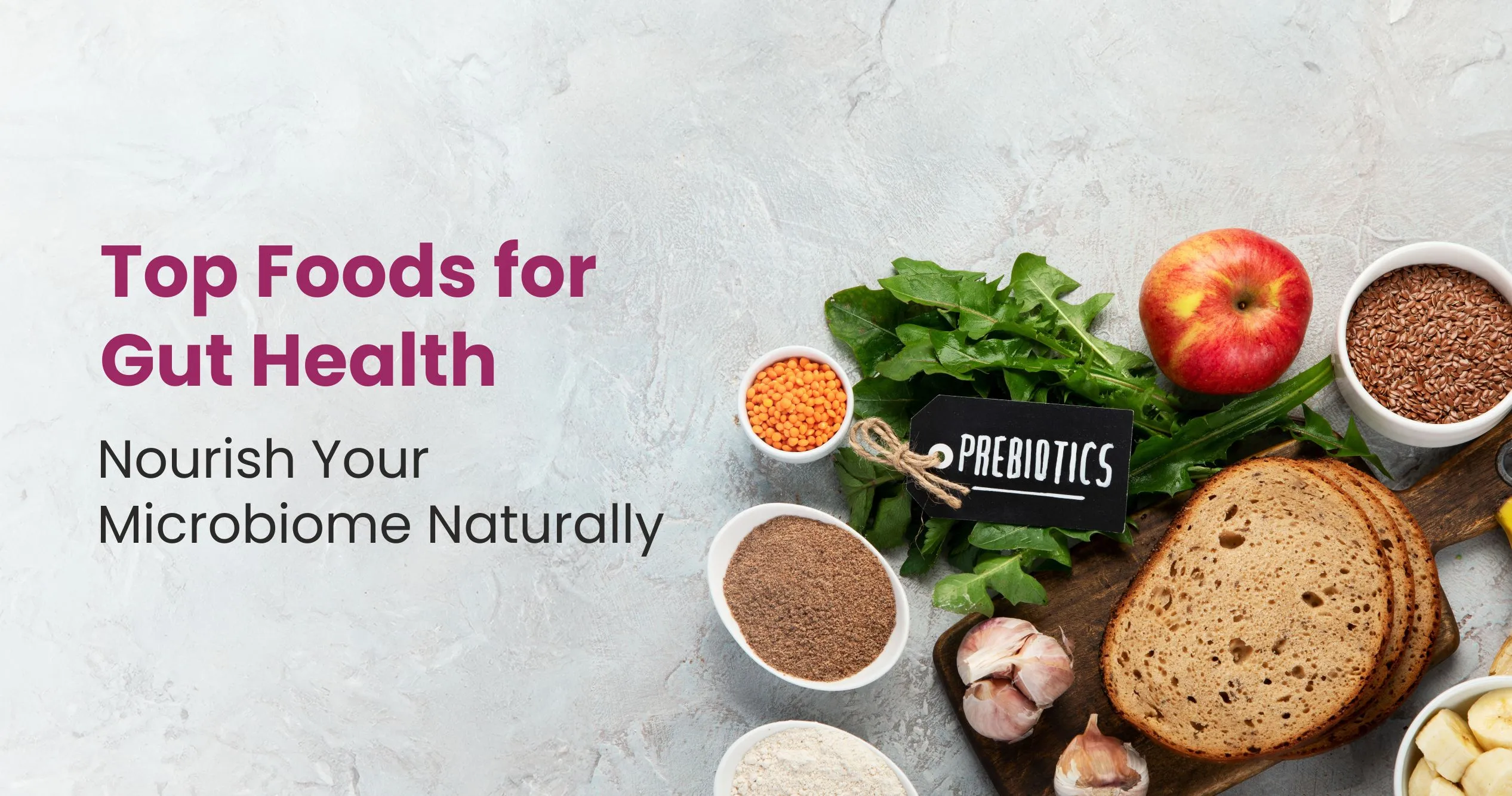Top Foods for Gut Health: Nourish Your Microbiome Naturally
Mar 22, 2024

Did you know that your gut contains the secret to increased health and well-being? You should be grateful for the billions of gut bacteria and other microorganisms, also known as 'the gut microbiota', and the function they play in your digestion. Improving your gut health can help reduce gastrointestinal difficulties, but it is also important for maintaining and regulating bodily processes and keeping your systems working smoothly. It should come as no surprise that the foods you eat on a daily basis have a significant impact on your gut microbiome.
In this article, we will look at a few popular foods that are beneficial to gut health and may be incorporated into a daily diet.
Why is Gut Health Important?
A balanced gut microbiome supports efficient digestion, strengthens the immune system, helps regulate metabolism, and can even impact mental health. An imbalance, however, can lead to a range of issues, including digestive disorders, chronic inflammation, and increased susceptibility to infections. Therefore, incorporating gut-friendly foods into your diet is key to nurturing a healthy microbiome.
Top Foods for a Healthy Gut
A healthy gut is important for supporting the immune system and preventing sickness. Here are meals that nourish and maintain your gut microbiota, so improving your health from the inside out.
1. Fermented Foods
Fermented foods are a powerhouse of beneficial bacteria, also known as probiotics. These live microorganisms can help replenish and diversify the gut microbiome. Some excellent fermented food choices include:
- Yoghurt (look for varieties with live and active cultures)
- Kefir (a fermented milk drink)
- Sauerkraut
- Kimchi
- Tempeh
- Miso
- Kombucha
2. High-Fibre Foods
Fiber acts as food for the beneficial bacteria in your gut and promotes their growth and diversity. Aim to include a variety of high-fiber foods in your diet, such as:
- Nuts and seeds (almonds, chia seeds, flaxseeds)
- Legumes (lentils, chickpeas, black beans, kidney beans)
- Vegetables (broccoli, Brussels sprouts, artichokes, asparagus)
- Fruits (berries, apples, pears, avocados)
- Whole grains (brown rice, quinoa, oats, whole wheat bread)
3. Prebiotic Foods
Prebiotics are a type of fibre that the human body cannot digest, serving as food for our gut bacteria. Incorporating these into your diet can help boost your gut health by supporting the growth of beneficial bacteria. Foods rich in prebiotics include:
- Oats
- Whole wheat
- Chicory root
- Asparagus
- Bananas
- Garlic
- Onions
4. Polyphenol-Rich Foods
Polyphenols are plant compounds with antioxidant properties. They can promote gut health by enhancing the growth of beneficial bacteria while inhibiting the growth of harmful bacteria. Consider incorporating the following polyphenol-rich foods into your diet:
- Berries (blueberries, raspberries, strawberries)
- Green tea
- Dark chocolate
- Red wine (in moderation)
- Olive oil
- Nuts and seeds
5. Lean Proteins
Incorporating lean proteins such as chicken, fish, tofu, and legumes into your diet can also benefit gut health. These foods are easily digestible and can help maintain the integrity of the gut lining, preventing leaky gut syndrome and other digestive issues.
and can help maintain the integrity of the gut lining, preventing leaky gut syndrome and other digestive issues.
Incorporating Gut-Healthy Foods into Your Diet
Eating for your gut health should not be complicated or bland. With some creativity and planning, you can easily integrate foods that support a healthy gut microbiome into your daily diet. Here are some tips and ideas to get you started.
- Start Your Day Right: Begin your day with a breakfast that includes yogurt or kefir. These fermented foods introduce beneficial bacteria into your gut. You can also add a sprinkle of chia seeds or flaxseeds.
- Smart Snacking: Instead of reaching for chips or sugary snacks, go with a small portion of nuts. These alternatives are rich in fibre and support your gut bacteria.
- Fibre-Rich Meals: Try Incorporating whole grains, beans, and legumes into your main meals. Go with dal tadka, sprouted moong and other grains to make salads and light snacks.
- Diversify Your Diet: Just do not stock to your favourite food, try to eat a wide variety of dishes and foods. This helps diversify the healthy bacteria in your gut.
Foods to Avoid or Limit for Better Gut Health
While adding beneficial foods to your diet is crucial for gut health, it is equally important to know which foods can be harmful. Certain foods can disrupt the delicate balance of your microbiome and cause digestive issues:
- High-Sugar Foods: Sugary snacks, beverages, and desserts acts as a nutrition source for harmful bacteria and yeasts in your gut.
- Processed Foods: Often high in preservatives, additives, and unhealthy fats, processed foods can negatively affect the good bacteria of oyur gut.
- Certain Fats: Trans fats and saturated fats found in fried foods and some animal products can cause inflammation, impacting gut health. They may also support the growth of bad bacteria.
Final Words
Your gut microbiome deserves nourishment from the right foods only. It is also essential for your overall health. Incorporate high-fibre foods, fermented products, polyphenol-rich foods, lean proteins, and healthy fats into your diet to support your gut health. Always focus on diversity in your diet to flourish healthy gut microbiome.
For those who are curious about the state of their gut health or seeking personalized dietary recommendations, Apollo Diagnostic offers comprehensive gut microbiome assessments and nutritional guidance. With a focus on precision and care, we can help you understand your gut's unique needs. Take a step towards your gut health and schedule your consultation now!
FAQs
1. What are the benefits of a healthy gut?
A healthy gut supports proper digestion, nutrient absorption, and a robust immune system. It also promotes better mental well-being and can even aid in weight management.
2. Are dairy products like curd and yoghurt safe for lactose-intolerant individuals?
Yes, fermented dairy products like curd and yoghurt are generally well-tolerated by most lactose-intolerant individuals as the live bacteria help break down lactose.
3. How can I introduce more fibre into my diet gradually?
Start by adding small portions of high-fiber foods like whole grains, lentils, and vegetables to your meals. Increase the quantity gradually to allow your gut to adjust.
4. Can spices and herbs really support gut health?
Absolutely! Many Indian spices and herbs, such as ginger, cumin, and turmeric, have anti-inflammatory properties and can aid digestion and gut health.
5. Is it necessary to take probiotic supplements for a healthy gut?
While probiotic supplements can be beneficial, a diverse diet rich in fermented foods, prebiotics, and fibre can often provide sufficient probiotic support.
Related Blog Post
Blog Categories
- Child Health
- Mens Health
- Women's Health
- Mental Health
- Health Myths & Facts
- Fitness
- Nutrition/Recipes
- Remedies
- Weight Management
- Stress Management
- Health Supplements
- Addiction Management
- Disease Management
- Allergy
- Anemia
- Arthritis
- Asthma
- Autoimmune Diseases
- Blood Pressure
- Cancer
- Deficiencies
- Dengue/Malaria/Chikungunya
- Diabetes
- Eye Problems
- Heart Diseases
- Hepatitis
- HIV/AIDS/STD
- Hormonal Imbalance
- Infection/Flu/Viral
- Kidney
- Liver
- Menstrual Problems
- Pregnancy
- Skin & Hair Problems
- Stomach Ailments
- Thyroid
- Others
- Health Checkups
- Diagnostics/Pathology
- Lifestyle & Wellness
- Covid
- Medical Tests
- Cholesterol
- Health Tips
- Parent Care/Old Age
- Lungs
- Food Intolerance








